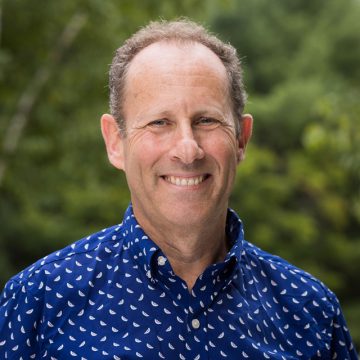Dartmouth Geisel School of Medicine Dean Duane Compton, PhD, has announced that virologist David A. Leib, PhD, has been reappointed to a second term as chair of the Department of Microbiology and Immunology. Leib, a professor of microbiology and immunology and adjunct professor of biology at Dartmouth, has served as the department’s chair since 2018.
“I’m excited to reappoint Dr. Leib as chair of the Department of Microbiology & Immunology,” says Compton. “His strong leadership of the department has helped it to grow even when his first term of service involved managing through the pandemic. He has demonstrated exceptional support of his students, staff, and faculty in the department.”

Leib joined the Dartmouth faculty in 2009 and has built a successful research program that has been focused on the discovery and explanation of new vaccines and therapeutics for neonatal herpesvirus (HSV) infections. He also teaches undergraduate and graduate courses in virology at Dartmouth.
“I feel humbled by the feedback received in reviews from the department and from other chairs, and to have been asked to serve as chair for another five years,” says Leib. “My overall goals will include continuing to recruit stellar new faculty, retaining our current faculty, and continuing to provide outstanding training and mentorship for our graduate students, postdocs, and junior faculty in the department. That’s really the part of the job that I enjoy the most—working to maintain Microbiology and Immunology as a thriving and vibrant community.”
A native of London, England, Leib earned a BSc in microbiology at Birmingham University in 1983. He then completed his PhD in 1986 at Liverpool University where he studied non-human primate herpesviruses.
Leib continued his studies in the U.S. as a postdoctoral fellow at Harvard University in the lab of Priscilla Schaffer, a noted herpes virologist. He joined the faculty at Washington University in St. Louis, MO in 1990, in the Departments of Ophthalmology and Visual Sciences and Molecular Microbiology.
At Washington University, Leib’s lab continued to study HSV pathogenesis with a focus on immunity and HSV countermeasures. In addition, his lab developed new ways to image HSV infection and spread utilizing real-time bioluminescence imaging. In 2009, Leib joined the faculty at the Geisel School of Medicine as a professor and relocated his lab to Dartmouth.
Reflecting on his first term as chair and his field of microbiology and immunology, Leib says, “Recruitments of several new faculty were definitely the highlights of my first term. Leading the department during the pandemic was very challenging, as I’m sure it was for all the chairs. But because of that experience, people have a new awareness and a better appreciation of what microbiologists and immunologists do and why the work we do is important. It’s also important for us to get that message out to the broader community where trust of science and vaccines has significantly eroded.”
Leib adds: “Moving forward, I’m very excited to see what we’ll be able to accomplish over the next five years. I work with great faculty, students, postdocs, staff, and administrators—it’s an amazing group in Microbiology and Immunology that is always working and collaborating for success for Geisel and the department.”
Founded in 1797, the Geisel School of Medicine at Dartmouth strives to improve the lives of the communities it serves through excellence in learning, discovery, and healing. The Geisel School of Medicine is renowned for its leadership in medical education, healthcare policy and delivery science, biomedical research, global health, and in creating innovations that improve lives worldwide. As one of America’s leading medical schools, Dartmouth’s Geisel School of Medicine is committed to training new generations of diverse leaders who will help solve our most vexing challenges in healthcare.